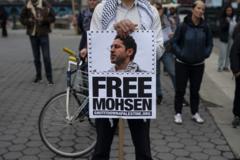**José Ángel Canobbio's capture underscores escalating efforts by Mexican security forces amid heightened international scrutiny.**
**Sinaloa Cartel Faces Setback as Key Security Chief of Iván Guzmán Apprehended**

**Sinaloa Cartel Faces Setback as Key Security Chief of Iván Guzmán Apprehended**
**Arrest marks a significant development in the ongoing battle against drug trafficking in Mexico.**
The Mexican army has delivered a significant blow to the notorious Sinaloa drug cartel with the recent arrest of José Ángel Canobbio, also known as "El Güerito" (little blond one), in the city of Culiacán, Sinaloa's capital. Canobbio is believed to be the right-hand man of Iván Archivaldo Guzmán, one of the sons of the infamous incarcerated drug lord Joaquín "El Chapo" Guzmán.
Security officials stated that Canobbio was responsible for the security operations under Guzmán's leadership, highlighting the arrest as a critical setback for the cartel. His capture coincided with the United States officially designating the Sinaloa cartel as a foreign terrorist organization (FTO), a classification aimed at enhancing the U.S. government's strategies to tackle powerful crime syndicates.
The U.S. State Department's designation also included seven other crime groups from Latin America, such as the powerful Jalisco New Generation cartel (CJNG) and the Gulf cartel, exerting pressure on the Mexican government to intensify their fight against these organizations and the illicit fentanyl trade.
In an earlier agreement, Mexican President Claudia Sheinbaum was able to delay the implementation of a planned 25% tariff on Mexican imports to the U.S., which signified a diplomatic nuance in the U.S.-Mexico relations. The arrest of Canobbio, who had previously been indicted in absentia by a federal grand jury in Chicago for smuggling fentanyl, may serve as an indication of Mexico's commitment to combating drug trafficking.
David Saucedo, a security expert, noted that Canobbio's involvement was crucial in facilitating the cartel's fentanyl operations, suggesting that his swift extradition to the U.S. is expected. The developments not only resonate with national security policies in Mexico but also reflect the growing intensity of international law enforcement collaboration against drug trafficking operations.
Security officials stated that Canobbio was responsible for the security operations under Guzmán's leadership, highlighting the arrest as a critical setback for the cartel. His capture coincided with the United States officially designating the Sinaloa cartel as a foreign terrorist organization (FTO), a classification aimed at enhancing the U.S. government's strategies to tackle powerful crime syndicates.
The U.S. State Department's designation also included seven other crime groups from Latin America, such as the powerful Jalisco New Generation cartel (CJNG) and the Gulf cartel, exerting pressure on the Mexican government to intensify their fight against these organizations and the illicit fentanyl trade.
In an earlier agreement, Mexican President Claudia Sheinbaum was able to delay the implementation of a planned 25% tariff on Mexican imports to the U.S., which signified a diplomatic nuance in the U.S.-Mexico relations. The arrest of Canobbio, who had previously been indicted in absentia by a federal grand jury in Chicago for smuggling fentanyl, may serve as an indication of Mexico's commitment to combating drug trafficking.
David Saucedo, a security expert, noted that Canobbio's involvement was crucial in facilitating the cartel's fentanyl operations, suggesting that his swift extradition to the U.S. is expected. The developments not only resonate with national security policies in Mexico but also reflect the growing intensity of international law enforcement collaboration against drug trafficking operations.





















